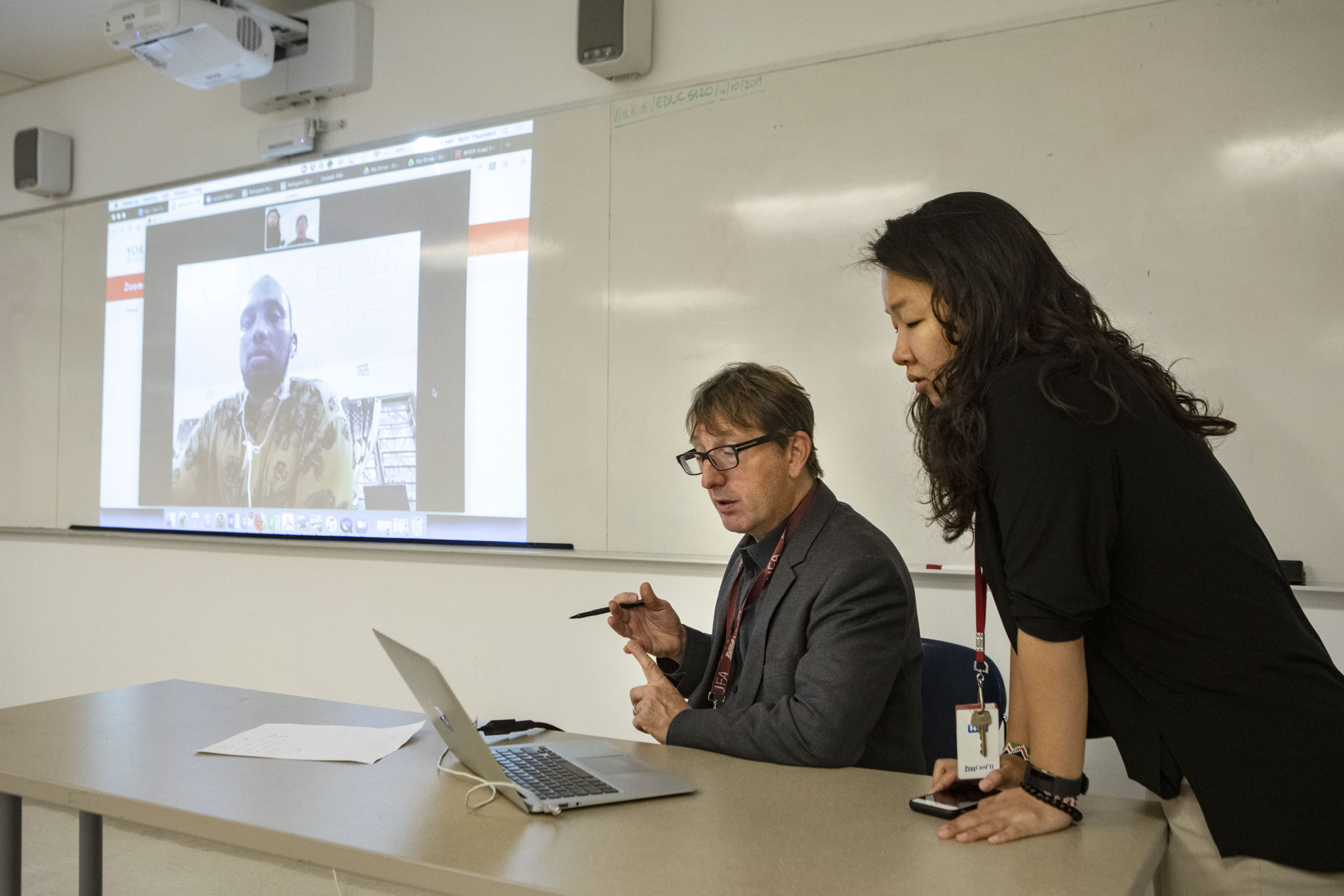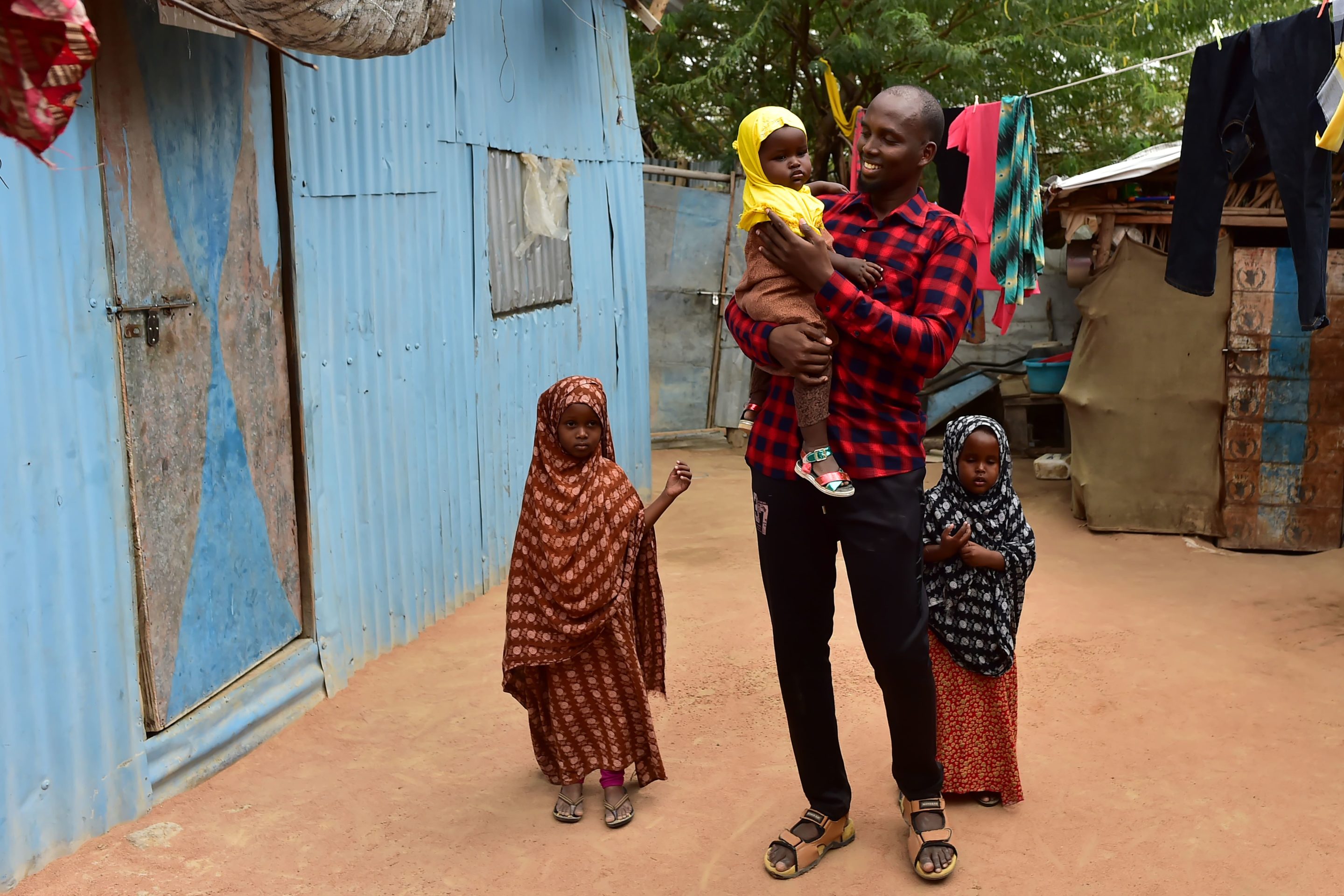
(From left to right) York University master’s student Abdikadir Bare Abikar, studying from Dadaab, Kenya, is seen onscreen in a Toronto classroom as he speaks with York assistant professor Kurt Thumlert and Borderless Higher Education for Refugees program administrator HaEun Kim.
Master’s student in Kenya’s Dadaab refugee camp plays active role in campus life at Canada’s York University
By Lauren La Rose
Abdikadir Bare Abikar has never seen York University in person, yet distance has proved to be no barrier for the graduate student who has already left a lasting imprint on the Canadian campus — a community he is proud to call his own.
Abikar is currently pursuing his Master of Education degree at York — Canada’s third-largest university — without ever having set foot on campus. Originally from Somalia, Abikar has called Dadaab home for the past 20 years, living in the remote Ifo refugee camp in Kenya. He has been pursuing higher education since 2013 through online learning.
“There’s a lot of inclusivity,” said Abikar. “We don’t feel our absence from the campus.”
“We are learning a lot of things from York University and the professors have really integrated us through their programs and really helped us.”
Abikar is among only seven refugee students enrolled in a master’s degree program in Dadaab — a camp that is home to more than 200,000 people. He is in rare company, among only three per cent of refugees globally who are able to access university.
But as his professors and peers can attest, the married father of three is determined to leave the university experience with more than just a degree. From daily two-hour walking commutes to the computer lab or video chats from home, he is actively working on projects and initiatives benefiting classmates in both Canada and Kenya.
Sitting in a lower-level classroom in Winters College — home to York’s Faculty of Education — Farra Yasin exchanges waves and smiles with Abikar as they speak on an online video chat. Since first forging their connection through their work on York Graduate Students in Education council (YGSE) and have remained friends since.

Abdikadir Bare Abikar is seen with his three daughters outside of their home in Dadaab, Kenya. ©UNHCR/Anthony Karumba
“When Abdikadir came on council, we did not really have someone to keep us connected with the community in Dadaab,” recalled Yasin, a research associate at York who earned a PhD from the Toronto-based university. “When he took on the IT leadership role, he was really helping to foster that community between the two cohorts.”
Abikar has also gained significant skills and insights from his time on council.
“I have learned that students have a lot of voice. Wherever they stand, they can help become the ambassadors of whatever they are,” he said. “The council has given me a different dimension of leadership.”
Mirco Stella is getting used to pre-dawn wakeups. He leads a weekly hour-long online tutorial with students in Dadaab and will be up at 5 a.m. to ensure preparations are in place ahead of the morning session. As YGSE co-chair, Stella and fellow council members have held meetings as early as 8 a.m. Toronto time — seven hours behind Dadaab — to ensure Abikar can participate.
“I think the major contribution, in this sense, from Abikar has been to try to also push other students into sort of taking on leadership positions,” said the PhD student. “He’s trying to work a lot — especially with the new cohort of students — to try to develop leadership among themselves as well.”
Long before their paths converged at York, Mohamed Duale and Abikar were bonded by more than their pursuit of higher learning. Like Abikar, Duale and his family were refugees who left Somalia, resettling in Canada in the
mid-1990s.
During the first two years of his PhD program, Duale was Abikar’s teaching assistant (TA) — a role Abikar also took on in a course Duale directed. Now as fellow graduate students, the duo was part of a collective who co-authored an article about the challenges experienced by refugee teachers. The paper was published in Forced Migration Review, a journal edited by the Refugee Studies Centre at Oxford University.
Duale said he hopes in the longer term to see more of what they were able to accomplish: research about refugees being done by refugees.
“Eighty-five per cent of the research is coming from the global North even though 85 per cent of refugees live in the global South. And the voices of refugees even among that 15 per cent is quite nonexistent in terms of the refugee research,” said Duale.
“I think there’s a real value to investing in higher education for refugees, if not as a way to empower them, but also to tell us something about what it means to be a refugee.”
York is part of the Borderless Higher Education for Refugees (BHER) project. BHER is an international collaboration between Canadian and Kenyan universities and NGO partners in Canada, and is supported by UNHCR.
“There is a big, big demand and need for education among refugees and in Dadaab,” said BHER program administrator HaEun Kim. “There are overcrowded classrooms, there are untrained teachers; and so there’s a big demand for education, but there isn’t the infrastructure in place to run quality education. So, this was responding to that need.”
Kurt Thumlert, an assistant professor in York’s Faculty of Education, said much of the work Abikar has done is “creating new technology in self-directed ways.”
As part of a course about technology and learning, Abikar co-created RefugeesRespond.org with Abdullahi Yussuf Aden. “They built this website in order to … have a platform to tell their own stories, as well as, again, to develop these technology competencies that they can apply to their situations as teachers there,” said Thumlert. “They do see themselves as changemakers in the present and in the future, which is really inspiring to me.”


